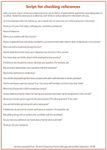Checking references
Are you taking a risk by not checking potential employees' references? Getting information might be easier than you think.
Are you taking a risk by not checking potential employees' references? Getting information might be easier than you think. Use these strategies—and the script for talking to past employers posted at www.vetecon.com.
While you'd like to think that every applicant has told the truth and nothing but, it's just not safe to hire on this assumption. According to InfoLink Screening Services' 2005 Applicant Hit Ratio Analysis, 40 percent of employees in the healthcare profession had discrepancies in their reported past employment. That means that four out of every 10 applicants you see could be fudging.
Yet getting a reference to talk openly about their experiences can be like pulling teeth. You've likely heard—or even told—horror stories about what can go wrong if you say something less than glowing (read: lawsuit). So it's no wonder that former employers often avoid giving their candid opinion about that team member who's moving on.
The myths about reference giving
Interestingly, the actual number of lawsuits that result from giving references is low, according to the National Workrights Institute, a nonprofit organization based in Princeton, N.J. "The truth is that very few employers are ever sued for defamation and almost none are found liable," the group's Web site says. Employees seldom win these cases, because they must prove malice. "In essence, they have to show not only that the statements made in the reference were defamatory and false, but also that they were unusually reckless and malicious and that the employer had no basis for making the statements at all."
There's also risk if you're misleading about the employee's performance because you're too positive. This was the case when Allstate Insurance Co. provided a neutral reference letter for Paul Calden indicating that the company released him following a restructuring process, according to the Nonprofit Risk Management Center in Arlington, Va. In fact, the company had fired him for bringing a gun to work. He went on to shoot five co-workers, killing three, at his new place of employment, which had taken into account the reference letter when hiring him.
Despite the risk of not providing candid information, references are often guarded when you call. But that's no reason to skip this step. At the very least, you can verify the potential candidate's employment history. And you might get lucky and learn more. After all, it's really in references' best interest to provide factual, candid information. They'd like the same courtesy when they're on the other end.
Pick up the phone
Most human resource professionals suggest you initially contact a reference by phone. It's faster and you get a chance to ask follow-up questions. Plus, you can assess nonverbal communication, such as tone of voice, emphasis, and hesitation.

Look online
"I strongly recommend taking this step," says Veterinary Economics Hospital Management Editor Mark Opperman, CVPM. "I'm often amazed at what I can learn from past employers."
"I'm often amazed at what I can learn from past employers," says Hospital Management Editor Mark Opperman. Get started with this script for checking references at www.vetecon.com.